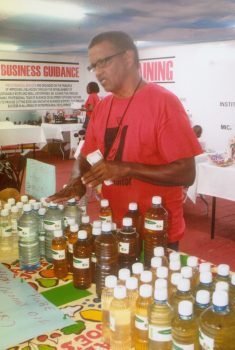The journey from being a Primary School teacher in the South Rupununi village of Achiwuib has brought Edwin Looknauth right back to his earliest adult employment, working as an assistant to his grandmother, Drupattie, whose reputation as a coconut oil seller in Bourda Market, he insists, some people can still recall.
These days, Edwin, whose trading name is Uncle Andrew, is the sole proprietor of Aunty Dur’s Coconut Oil, the label a tribute to his now deceased grandmother. Over time, she had come to be known as the coconut oil lady and perhaps not altogether unexpectedly, these days, he is referred to by his customers as the coconut oil man.
These days Aunty Dor’s coconut oil is traded from the roadside on Hincks Street in downtown Georgetown. “It’s reasonably good business,” Edwin says.
Between serving as an assistant and trading on Hincks Street, Edwin served as a Primary School Teacher, a Fire Officer and a Security Guard. These days, his wife and three of his five children have joined forces with him to produce both regular and virgin coconut oil, his only major concern being the fact that the mounting demand for coconuts has doubled prices to around $50 each. He believes that the continued growth of the coconut oil and coconut water sub-sectors could cause prices to at least double again over the next year. Coconut oil prices are climbing too. Two years ago regular coconut oil was trading at $500 per pint. The ‘going price’ these days is $1,000.

Over time, whilst coconut oil has found its way into the hallowed halls of beauty and cosmetics, Edwin’s market remains rooted in ‘the man in the street,’ as a sort of herbal healer and a liniment. He disclosed that there is also a modest market among people who use coconut oil (mixed with mayonnaise) as a spread and others who are partial to a bit of coconut oil in their coffee.
At Mahaica where he lives, the family joins forces to break and grate the coconuts then extract the milk, depositing it in 52-gallon drums in order to extract then boil the fat to the stage of regular coconut oil. On the streets, these days, that fetches $500 per pint. Virgin coconut oil retails at $1,000 per pint.
Weekly wholesale and retail sales of around 45 gallons per week targets a regular clientele that includes retail customers as well as smaller distributors.
More recently, his ambitions have extended beyond his routine pursuits. He offers scented, clear and dark coconut oil and has experimented with coconut casareep, albeit in a limited way, the drawback of the product being its particularly limited shelf life. The recipe, he says, is simple. You boil the coconut water until it gets progressively thicker and darker after which you add your spices (cinnamon, clove, pepper etc.) to taste.
Last weekend’s Uncapped event at the Sophia Exhibition Centre marked the first ‘outing’ for Aunty Dor’s coconut oil. Edwin concedes that ordinary vendors often tend to keep their distance, preoccupied as they are with “chasing a dollar.” Having been to Sophia last weekend his curiosity has been awakened regarding the ‘rules’ of the trading game, not least the complexities of marketing and packaging and labeling and product quality testing in circumstances where he has begun to visualize Aunty Dor’s label on the shelves of supermarkets and pharmacies.
Packaging and labelling represents relatively new territory to him. Aunty Dor’s product is currently offered in regular water bottles and chopped down rum bottles commonly known as ‘grenades. He agrees that his packaging and labeling will have to go further ‘up market’ if he wants to swim with the sharks. Edwin says he is now firmly anchored in the coconut oil trade.
Edwin’s next major goal is the acquisition of the seventy acres of farmland in the Mahaicony River which he applied for about four months ago. Most of it will be used to cultivate five-year yielding coconuts. “Three-year coconuts don’t give as much water, he says. Part of the land will be used to plant cash crops while he waits to harvest his own coconuts.





